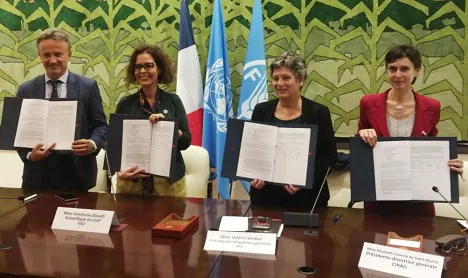On the 18th of October, as part of its Science and Innovation 2022 Forum in Rome, the Food and Agriculture Organization of the United Nations (FAO) has signed an agreement protocol with the 3 French research organizations INRAE, Cirad and IRD for the period 2022-2027 on the transformation of agricultural and food systems. This cooperation agreement shows a strong desire to develop international partnerships in order to meet the challenges of climate change, biodiversity, the sustainable management of natural resources and the transformation of agricultural and food systems. The three French organizations are committed and have mobilized their networks of partners on the 5 continents.
 Left to right: Philippe Mauguin, CEO of INRAE, Ismahane Elouafi, chief scientist of FAO, Valérie Verdier, CEO of IRD, Elisabeth Claverie de Saint Martin, CEO of Cirad. © J. Huet
Left to right: Philippe Mauguin, CEO of INRAE, Ismahane Elouafi, chief scientist of FAO, Valérie Verdier, CEO of IRD, Elisabeth Claverie de Saint Martin, CEO of Cirad. © J. Huet
This is a follow-up to the framework agreement France-FAO (2022-2025) signed on October 5th 2022 by Catherine Colonna, French minister of Foreign Affairs and by Qu Dongyu, general director of FAO. The chief scientist of FAO, Ismahane Elouafi, and the three CEOs of the research organizations, Elisabeth Claverie de Saint Martin (Cirad), Philippe Mauguin (INRAE) and Valérie Verdier (IRD) have signed the research agreement protocol in the presence of Céline Jurgensen, ambassador and permanent representative of France to the United Nations in Rome, high-level representatives of FAO, including Laurent Thomas, deputy CEO, and the French delegation.
This cooperation is a significant contribution to the Paris Agreement and to the sustainable development goals set for 2030. It is also in line with FAO’s strategy for 2022-2031 and its very first Science and Innovation strategy adopted at the last FAO Council in June 2022.
A renewed collaboration framework between Cirad, INRAE, IRD and FAO
The session entitled “Partnership for co-developing research and innovation: sharing experiences from FAO and Cirad, INRAE and IRD” has helped put the new agreement into context by presenting results and prospects for cooperation on topics such as "One Health", responsible digital agriculture, agroecology and climate change. The challenges of transforming agricultural and food systems towards a greater resilience and sustainability, and the importance of the multi-stakeholder approach in contributing to open innovation and strengthening innovation systems in countries, were then discussed during a round table.
INRAE, Cirad and IRD have been cooperating for several years with FAO. This new framework agreement symbolizes the coherence and complementarity of the French agronomic, food and environmental research on topics of common interest (including in intertropical and Mediterranean areas) such as livestock, fisheries and aquaculture, agriculture and water, forests, plant and animal health, soils, agriculture, climate and biodiversity, in addition to other strategic areas discussed at the special session:
The Covid crisis has reinforced the desire to cooperate in the field of zoonotic disease prevention. The international initiative PREZODE initiated by INRAE, Cirad and IRD is part of the global action plan jointly developed in recent months by FAO, PNUE, OMS and OIE;
Responsible digital agriculture will contribute, through digital solutions, to a more sustainable agriculture, especially for the development of agroecology;
Adaptation to climate change, one of the priorities supported by FAO during the Council in June 2022;
The food security crisis is linked to many factors including climate change, but also conflicts and wars. It highlights the need to contribute to the strengthening of the resilience of food systems to systemic shocks and their profound transformation through social and technical innovation.
The 2022-2031 strategic framework and the new Science and Innovation strategy of FAO call for a strengthening of the partnerships with universities and research organizations for training, sharing scientific knowledge, as well as exchange ideas on emerging themes such as artificial intelligence, microbiome, bioeconomy and digital agriculture, scientific expertise, support to public policies, innovation, biotechnologies and prospects.
Five areas of cooperation
The framework agreement helps contemplate new collaborations in relation to intellectual property rights, publications and personal data management along five lines:
improving the coherence of the policies on food security and nutrition and their implementation by the States;
supporting the transition towards multiple economic, social and environmental performances of the food systems and territories;
strengthening health security, prevention and response to diseases in plant, animals and food in order to contribute to the improvement of global health in a “One Health” approach;
strengthening the resilience of vulnerable populations and improving crisis prevention and management, including food crises;
contributing to the implementation of FAO’s climate change strategy for the Paris Agreement, along with FAO’s biodiversity strategy.
For more information:
cirad.fr
